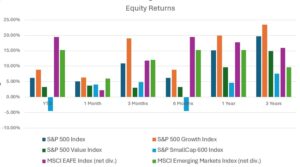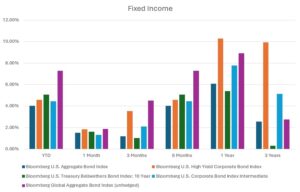Economic and Market Update
The second quarter’s economic activity can be characterized by global markets attempting to decipher the policy goals of President Trump. Liberation Day kicked off the quarter with the announcement of significant tariffs on most trading partners. Following a swift market reaction, the tariffs were delayed by 90 days as the Administration wanted to provide some time for deals to get done.
The 90-day reprieve allowed the economy to avoid the most detrimental impacts of the tariff policy. The economy contracted slightly in Q1 as-a-result of the acceleration of imports to get ahead of the tariffs. This acceleration of imports lead to a much higher than normal trade deficit which detracted from GDP growth. Much of the advance purchases were made in anticipation of the Liberation Day announcement, and subsequent orders in Q2 are expected to be significantly reduced because companies have already stocked up. This should lead to a lower than expected trade deficit and positive GDP growth for Q2. In fact, the Atlanta Fed’s GDPNow forecast for Q2 currently stands at 2.6%.[i] It should be noted that the trade deficit is not the sole contributor to positive GDP growth for Q2 as consumer spending remains positive.
Recent forecasts of recession have been pulled back some. At the end of May, J.P. Morgan reduced their expectation of recession from 60% to 40%.[ii] They do note, however, that the tariff shock should still impact growth and may result in a period of sub-par growth. Goldman Sachs cut their probability of recession to 30% in May, citing progress on trade deals.[iii] It’s not completely clear if this is on resilience of the consumer and businesses, or if this is a haircut of the uncertainty around Trump’s tariff policy in an extension of what has become known as the TACO trade. TACO is an acronym for “Trump Always Chickens Out.” It refers to the emerging habit of Trump to talk tough and issue very restrictive policy, only to subsequently push the deadline and effective dates. What is very unclear is if progress is actually being made behind the scenes. Are deadlines being pushed because deals are not getting done and Trump is afraid trading partners are calling his bluff, or are deadlines being pushed because deals are getting done and it takes time to work out the details? On the one hand, there’s evidence of progress with deals done or progressing between the U.S. and the U.K, Europe, India, and Canada. On the other, Trump has had to ratchet up rhetoric against Japan and South Korea, presumably because progress is lacking.
We’re now facing the first 90-day deadline, and the Administration is suggesting the deadline will slip to August at which time tariff policy will revert to those announced on Liberation Day. While markets are trading down on the news, they are not nearly as volatile as the first round of tariff announcements, suggesting market participants do not believe the worst-case scenario will come to fruition.
In the meantime, the Fed stays in waiting. Jerome Powell has noted the uncertainty of the trade policy and economic impact. The Fed is not getting the relevant data which would point to the impact tariffs are having on the economy because the policies are not being allowed to go into effect. The result is that it’s impossible to forecast to what extent companies will pass the tariff impacts on to consumers when they do finally go into full effect, what level of tariffs will ultimately stay in effect, or whether deals will get done where tariffs are no longer an issue.
Capital Markets Recovery
Following the tariff announcements on Liberation Day, global markets quickly fell to intra-year lows on April 8th. As soon as the tariff 90-day reprieve was announced, markets recovered through the end of the quarter. As the chart below shows, the S&P 500 returned 10.9% for the quarter, pulling returns out of negative territory to end the quarter at positive 6.2%. While 10.9% performance for a quarter is impressive, the more impressive number is the 24.5% recovery from the April 8th bottom through the end of June.
International markets are continuing to outperform domestic equities on a year-to-date basis with the stronger performance resulting from a continuing slide in the U.S. dollar. Developed international markets are up 19.5% on a year-to-date basis followed closely by emerging markets at 15%.
Fixed income returns were positive as interest rate movement was limited. In a year-to-date basis, the outperformance of the global aggregate is driven by the dollar decline.
While investors welcomed the market recoveries, a question that should be asked is whether anything has changed or should investors view the market recovery as signaling an all-clear?
One thing that has changed is that earnings expectations have come down. At the start of the year, consensus expectations for Q2 year-over-year earnings growth stood at 12.2%. As we start the earnings announcement period, that estimate has fallen to 5% according to Zacks Investment Research. Annual earnings expectations for 2025 have slipped from double digits to 7.2%. At the moment, expectations suggest earnings can rebound in 2026 and 2027 to roughly 13%, but there is significant uncertainty surrounding those expectations. With markets trading back to a forward price multiple which is well above historical averages, there certainly is concern that the forecasted earnings may not be realized, resulting in a market reset to more reasonable valuations.
The One Big Beautiful Bill Act of 2025
One aspect of uncertainty which has now been removed is congressional action on the federal budget and tax code. Trump’s original tax bill, the Tax Cuts and Jobs Act of 2017, had many provisions which were slated for expiration at the end of 2025. Left without intervention, the result would have been a substantial tax increase on most Americans. However, last week, Republicans in Congress were able to send the Senate’s version of the bill to Trump’s desk, which he signed into law on Independence Day.
We will have additional articles and commentary on the Big Beautiful Bill forthcoming, but for the moment, what is important is that it removes some of the tax uncertainty of the TCJA expirations.
If you have any questions regarding the content above, please reach out to your advisor.
[i] https://www.atlantafed.org/cqer/research/gdpnow#Tab3
[ii] J.P.Morgan Global Research, “The probability of recession has fallen to 40%,” May 27, 2025
[iii] USA Today, “Goldman Sachs cuts US recession odds to 30% after trade deal progress,” June 12, 2025
Disclosure:
The views expressed represent the opinion of Riverchase Wealth Management, LLC. The views are subject to change and are not intended as a forecast or guarantee of future results. This material is for informational purposes only. It does not constitute investment advice and is not intended as an endorsement of any specific investment. Stated information is derived from proprietary and nonproprietary sources that have not been independently verified for accuracy or completeness. While Riverchase Wealth Management, LLC believes the information to be accurate and reliable, we do not claim or have responsibility for its completeness, accuracy, or reliability.
Statements of future expectations, estimates, projections, and other forward-looking statements are based on available information and Riverchase Wealth Management, LLC’s view as of the time of these statements. Accordingly, such statements are inherently speculative as they are based on assumptions that may involve known and unknown risks and uncertainties. Actual results, performance or events may differ materially from those expressed or implied in such statements. Investing in equity securities involves risks, including the potential loss of principal. While equities may offer the potential for greater long-term growth than most debt securities, they generally have higher volatility. International investments may involve risk of capital loss from unfavorable fluctuation in currency values, from differences in generally accepted accounting principles, or from economic or political instability in other nations. Past performance is not indicative of future results.
Advisory services provided by Riverchase Wealth Management, LLC, a registered investment advisor.



